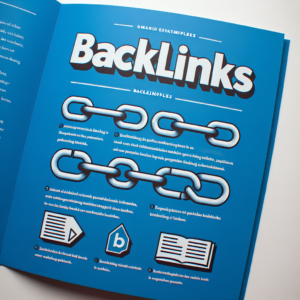Understanding the concept of backlinks is crucial for anyone involved in digital marketing or SEO. Backlinks are essential for enhancing the visibility and credibility of a website. These inbound links act as endorsements from other websites, validating the quality and relevance of your content to search engines. A well-rounded backlink profile can significantly boost a site's authority and rankings in the search engine results pages (SERPs). This informative guide will explore what backlinks are, their importance, and best practices for acquiring them. Recognizing the value of backlinks can directly influence your SEO strategies and lead to better ROI. The impact of backlinks cannot be overstated, making them a cornerstone of effective SEO practices. They not only drive organic traffic but also help establish your website as a thought leader in your domain. Effective utilization of backlinks can propel your website to new heights of performance and visibility. A comprehensive understanding of backlinks will empower your digital marketing efforts and lead to sustainable growth.

Generated with ContentGo AI
Backlinks are links from one website to another. They are also known as inbound or incoming links. These links are like votes of confidence, signaling to search engines that another website finds your content valuable and trustworthy.
Essentially, backlinks are part of a website's external link profile. When search engines crawl the internet, they locate these links and consider them as validation of a website's content quality. The higher the number and quality of backlinks a site has, the more trustworthy and credible it appears to search engines.
These inbound links can come from various sources, such as blogs, news sites, forums, or social media platforms. The context and anchor text of these links also play a role in determining how beneficial the backlink is for search engine optimization. For example, if a leading industry blog links to your website with a relevant keyword as anchor text, it can significantly boost your site's visibility.
Backlinks also help categorize web pages and index them accordingly. When multiple sites link to the same webpage or website, search engines begin to recognize that particular site as an authority in that subject area. This means that not just any backlink will do; getting links from reputable and relevant sites is key to improving your site’s authority and ranking.
Moreover, backlinks are not just for SEO; they serve multiple purposes. They can drive direct traffic to your site, bring in new audience segments, and provide exposure in different online communities. As a result, it is essential to focus on acquiring high-quality backlinks from authoritative websites to fully capitalize on their benefits.
The benefits of backlinks are multi-faceted. They help improve search engine rankings by signaling to search engines that your site is a reliable source of information. Higher rankings lead to more organic traffic. Backlinks also drive direct referral traffic, providing an immediate source of visitors who are likely interested in your content. Increased traffic can lead to higher engagement rates and lower bounce rates, both of which are positive signals to search engines.
Furthermore, backlinks contribute to higher visibility. When your content is linked on other websites, it exposes your brand to a broader audience. This can lead to more social shares, more mentions in other articles, and an overall increase in brand awareness. It’s like a chain reaction; the more backlinks you have, the more people are likely to notice and visit your site.
Backlinks also play a crucial role in fostering relationships within your industry. By getting mentioned on authoritative sites, you build credibility and trust within your niche. This can open doors to collaborations, partnerships, and other opportunities that can further benefit your online presence. These relationships can be invaluable for long-term success.
In addition to external benefits, backlinks can also improve the internal structure of your site. Quality backlinks often come with anchor texts that are relevant to your content, helping search engines to better understand the context and relevance of your pages. This added layer of understanding can result in better indexing and ranking for related keywords, further enhancing your SEO efforts.
Another overlooked benefit of backlinks is the indirect impact they have on your content strategy. Knowing that certain types of content attract backlinks can guide you in producing more of what works. This data-driven approach can make your content marketing efforts more effective and efficient, ensuring that your resources are used in the best possible way.
Overall, the cumulative effect of improved search engine rankings, increased traffic, higher visibility, industry relationships, better internal site structure, and refined content strategy makes backlinks.

Generated with ContentGo AI
Backlinks play a critical role in search engine algorithms. They are one of the key factors search engines use to determine ranking. High-quality backlinks from authoritative sites serve as endorsements, helping your site climb the search engine results pages (SERPs). Websites with more robust backlink profiles typically see better performance in search results.
The importance of backlinks cannot be overstated, as they form the backbone of search engine optimization. These links act as recommendations from other websites, signaling to search engines that your content is credible and worth referencing. When a high-authority site links to your website, it is akin to receiving a seal of approval, boosting your site's trustworthiness.
Beyond search engine rankings, backlinks contribute to building your brand's reputation. Being linked by various reputable websites enhances your brand's visibility and positions your business as an industry authority. This increased visibility can attract more visitors and potentially convert them into loyal customers or clients.
Another crucial aspect is the quality versus quantity of backlinks. While having numerous backlinks can be beneficial, their quality is far more critical. Links from well-respected, authoritative websites carry more weight in ranking algorithms than links from lesser-known or spammy sites. High-quality backlinks show search engines that your website is a trusted and valuable resource, leading to better SEO outcomes.
In addition to boosting search engine rankings and enhancing brand reputation, backlinks also create pathways for search engine crawlers to discover your site. When search engines index your site, they follow links to understand the structure and content. Robust backlink profiles make it easier for crawlers to find and index your pages, ensuring that your important content is visible in search results.
Therefore, prioritizing the acquisition of high-quality backlinks should be a cornerstone of your digital marketing strategy. By focusing on obtaining links from reputable sources and avoiding low-quality links, you can improve your website's search engine performance, drive organic traffic, and solidify your standing as an authority in your field.
Backlinks add value by enhancing your website’s authority, relevancy, and trustworthiness. When reputable websites link to you, it not only drives traffic but also signals to search engines that your content is valuable. This, in turn, increases user engagement and retention rates, further boosting your site’s performance.
Authority is a critical aspect of a website's reputation. Search engines consider backlinks from high-authority sites as endorsements. The more endorsements your site receives, the more likely it is to be deemed credible and authoritative by search engines. This helps improve your site’s ranking, making it more visible to users searching for relevant content.
Relevancy plays a significant role in how backlinks add value. Links from websites within your industry or niche are particularly beneficial. They indicate to search engines that your content is relevant to specific topics or keywords. This improves your positioning in search results, especially for queries related to your field.
Backlinks from trustworthy sites contribute significantly to your website's trustworthiness. Trustworthiness is a key factor in Google's algorithm. When a search engine notices links from reliable and reputable sources pointing to your site, it acknowledges your site as trustworthy. This can protect you from penalties and ensure your site remains favorably ranked.
User engagement is another area where backlinks add value. Quality backlinks often come from compelling, well-trafficked content. When users click on these links and find your content valuable, they are more likely to stay longer on your site, explore multiple pages, and return in the future. This behavior signals to search engines that your site provides valuable content, further improving your rankings.

Generated with ContentGo AI
There are several types of backlinks, each with its own value:
Natural links are the gold standard of backlinks. They occur without your intervention when someone finds your content valuable enough to link to. These links are hard-earned, often taking time to accumulate. However, they offer the highest value as they underscore the authenticity and trustworthiness of your content. Natural links from reputable sites can significantly uplift your search engine rankings and attract organic traffic, making them indispensable for long-term SEO success.
Manual links, on the other hand, require proactive efforts. Writing guest posts, securing features in industry publications, or partnering with other websites are common ways to acquire manual links. Although these links may not have the same organic allure as natural ones, they are equally important for building a strong backlink profile. By focusing on authoritative websites, manual links can also enhance your site's relevancy and credibility. While they might require negotiation and collaboration, the payoff in terms of traffic and visibility can be substantial.
Self-created links, often viewed with caution, involve creating your own backlinks through comments, forums, or business directories. While easier to obtain, they come with the caveat of being less valuable in the eyes of search engines if abused. To make the most of self-created links, always prioritize quality over quantity.
Engage genuinely in online discussions, ensuring your link appears naturally within the context of the conversation. Used prudently, self-created links can complement other types of backlinks by adding diversity to your backlink profile.
Understanding the diversity and strategic value of these backlink types is crucial for optimizing your SEO approach. While natural links continue to be the most sought-after due to their organic and high-trust nature, manual and self-created links also play pivotal roles in a holistic backlink strategy. Combining these methods effectively can create a robust, resilient backlink profile, enhancing your site's authority, visibility, and overall search engine performance.
Acquiring quality backlinks requires a strategic approach that is both methodical and consistent. Backlinks are not just about quantity; the quality and relevance of the links matter significantly. Here are some in-depth strategies you can implement:
Learning how to generate effective backlinks can significantly enhance your "blue page's" SEO performance. By understanding their importance and leveraging best practices for obtaining them, you set the stage for sustained organic growth and higher rankings. Backlinks act as digital endorsements from other websites, which search engines interpret as a sign of your site's credibility and authority. Not only do they drive referral traffic to your site, but they also help improve your search engine rankings by signaling that your content is valuable and worth referencing.
When you obtain high-quality backlinks from reputable websites, it sends a strong message to search engines like Google about the trustworthiness of your content. This increased trust can result in higher visibility in search engine results pages (SERPs), attracting more organic traffic. Furthermore, backlinks provide an opportunity to reach new audiences who might not have discovered your content otherwise. They serve as pathways that guide users from one valuable resource to another, enriching their overall browsing experience.
In addition to improving SEO performance, backlinks also play a crucial role in establishing your site's reputation within your industry. When authoritative sites link to your content, it positions you as a thought leader and a reliable source of information. This can lead to more opportunities for collaboration, guest blogging, and partnerships, further expanding your reach and influence. Effective backlink strategies can also foster valuable relationships with other content creators, opening doors to future networking and promotional efforts.
By focusing on generating high-quality backlinks, you're not just working towards improving your search engine rankings but also building a strong foundation for long-term online success. The process requires a combination of producing top-notch content, engaging in strategic outreach, and utilizing the right tools to monitor and analyze your backlink profile. As you accumulate more credible links, your "blue page" will become more visible to search engines and users alike, driving consistent traffic and enhancing your site's reputation.
Ultimately, the key to a successful backlink strategy lies in understanding the value of these links and continuously seeking opportunities to earn them. Whether through content creation, networking, or leveraging online tools, every effort you make to secure quality backlinks contributes to the growth and sustainability of your "blue page." Investing time and resources into this aspect of SEO is a smart move that can yield substantial benefits for your site's performance and visibility in the long run.